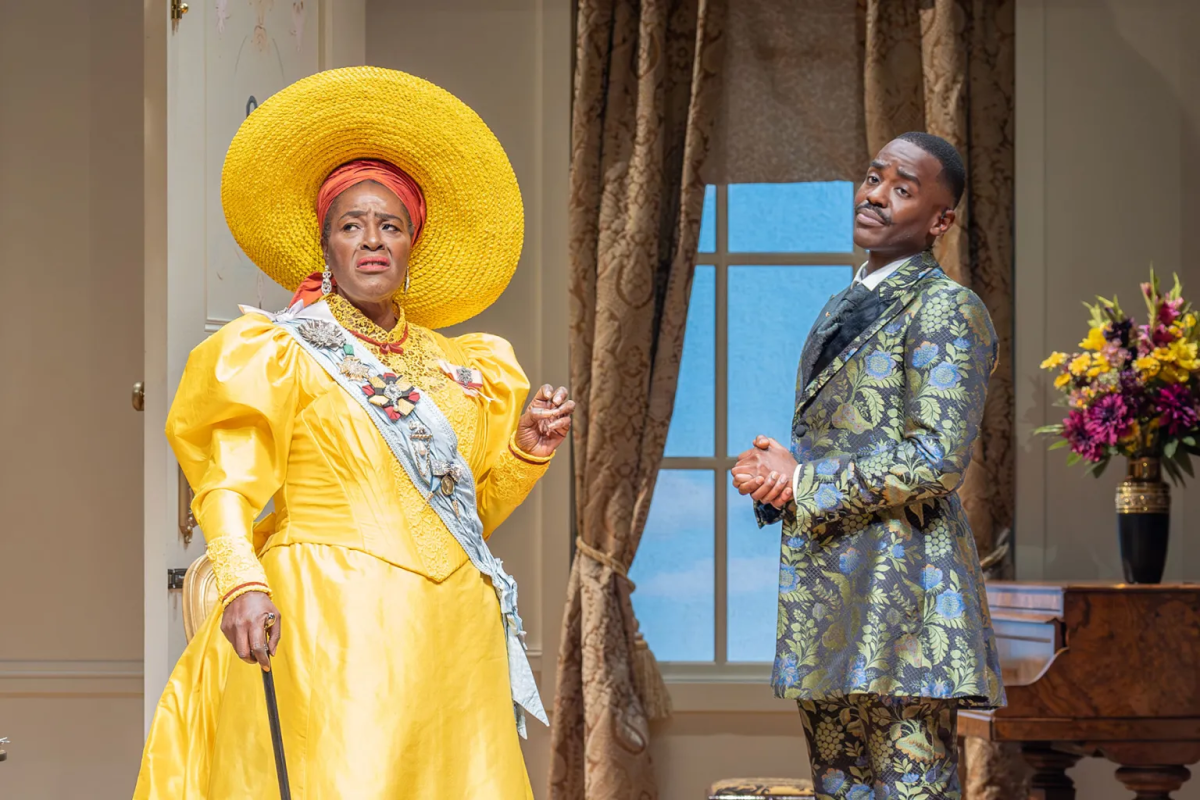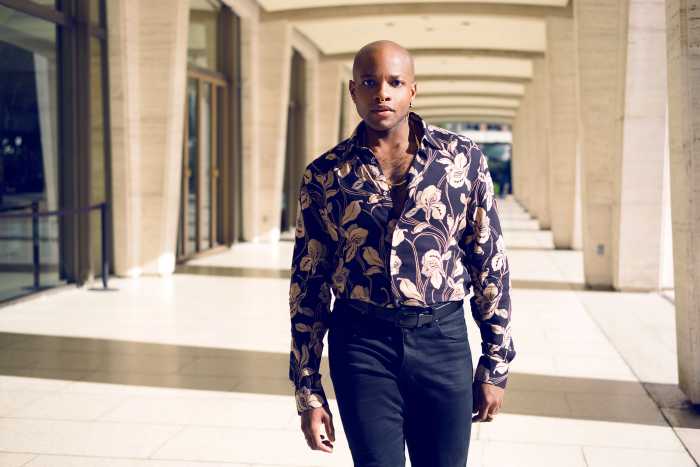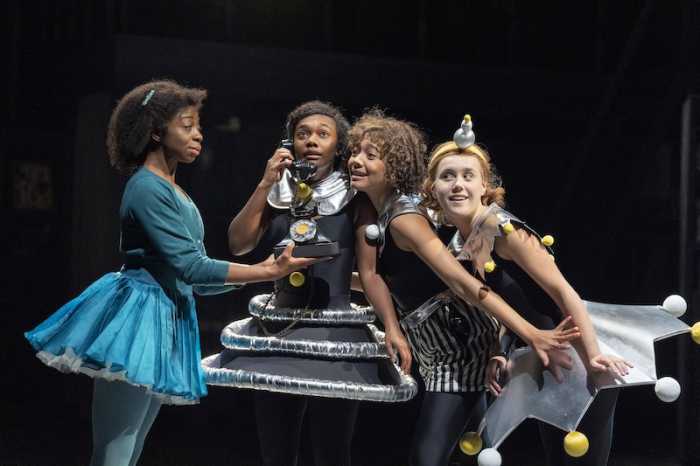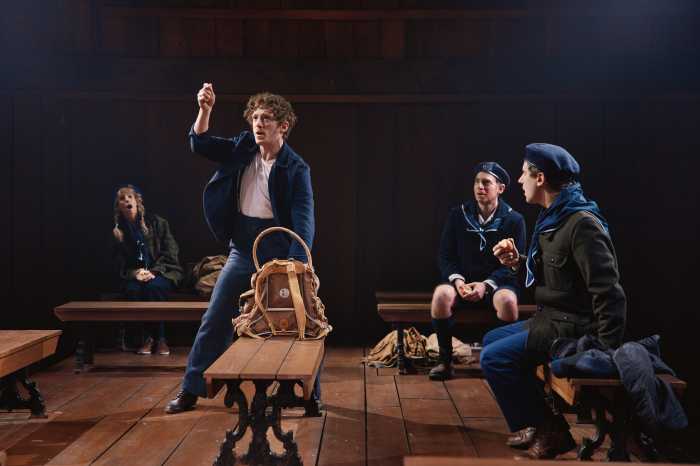“The Importance of Being Earnest” by Oscar Wilde has always been a camp classic since it premiered in 1895, but the new production at the National Theatre in London takes that to new heights. It features out actors Ncuti Gatwa (the new Dr. Who) and Hugh Skinner as Algernon and Jack — both in great form — and the genius casting of Sharon D Clarke as an imperious West Indian Lady Bracknell.
Wilde opened the play at the height of his fame while having a less-than-surreptitious love affair with Lord Alfred Douglas that infuriated Douglas’ father, the Marquess of Queensbury, who tried to disrupt opening night. Queensbury did bring Wilde down in court for “gross indecency,” getting him sentenced to two years of hard labor that broke Wilde. Subsequently Wilde’s most performed play, it closed after 88 performances, the great wit in Victorian disgrace.
It’s a tricky play that needs to be done “straight,” i.e., taking all those indelible arch lines seriously (to make them funny) and this cast delivers on those basics perfectly. But director Max Webster also makes the gay subtext more explicit while set in a time when LGBTQ people could not be open without severe penalty. So it is great fun watching the men — and the women who they are courting: Gwendolyn (Ronkẹ Adékọluẹ́jọ́) and Cecily (Eliza Scanlen) — subversively steal same-sex flirtations while ostensibly pursuing heterosexual marriages.
Richard Cant as Rev. Chasuble and Amanda Lawrence as Miss Prism are quite delightful as the older couple working their courage up to be with each other and Julian Bleach adds new comic dimension to the different manservants in town and country.
Sir Ian McKellen once said that Dame Edith Evans as Lady Bracknell in the 1952 movie version was “so acclaimed and strongly remembered that it inhibits audiences and actors years later” from being able to think of anyone else in the role. Ms. Clarke (who won the Olivier Award for the “Death of a Salesman” that went to Broadway) overcomes that and then some in a performance that brings the audience to its feet at the flamboyant and joyous curtain call — a firm rebuke to the current panic over drag. Rest easy Oscar. Your masterpiece endures.
This production runs through Jan. 25 and will be transmitted to cinemas worldwide through NT Live starting in February.
I missed Dan McCabe’s “The Purists” in New York in 2019 when Billy Porter directed, but I was happy to see it at the Kiln Theatre, transported to Sunnyside, Queens as two middle-aged Black hip hop artists (Richard People as Mr. Bugz and Sule Rimi as Lamont Born Cipher) spar with an older white man, Gerry Brinster (Jasper Britton), who is devoted to Broadway musicals from the Golden Age. Each is a purist in his way — wanting to keeping hip hop Black or trying to save the musical from how it has changed. Gerry is plenty open about his sexuality (officially bi but almost entirely gay) and there are secrets to be uncovered in the other characters.

The women in the play — Tiffany Gray as Val Karo and Emma Kingston as Nancy Einstein — are more practical, both aspiring hip hop performers but from Black and white perspectives. It’s a lively evening directed by Amit Sharma, the artistic director of the Kiln. And nothing is as black or white as it seems. Through Dec. 21. (There was a funny aspect to opening night with Imelda Staunton and her husband Jim Carter on hand as the old man made at least three references to roles and shows Staunton is shown in: Queen Elizabeth II (“The Crown”), “Gypsy,” and “Sweeney Todd.”)
There’s a real gem of a show at the Finborough, a pub theatre in Earl’s Court: “Lies Where it Falls” was written and performed by actor Ruairi Conaghan, whose uncle, Judge Rory Conaghan, was famously assassinated by the IRA in Belfast in 1974 when young Ruairi was just eight years old. In a riveting one-man 75 minutes, he takes us through how that trauma got unearthed after taking on the role of Patrick Magee, the IRA bomber who tried to assassinate Prime Minister Margaret Thatcher at the 1985 Conservative Party conference in Brighton and did kill five of her colleagues. When he subsequently is cast as the Player King in a “Hamlet” led by Benedict Cumberbatch, his crippling psychic pain comes to the surface and threatens his ability to go on.
A hit at the Edinburgh Festival, this is the English premier of Conaghan’s play — a uniquely personal take on “The Troubles.” Through Dec. 21.
Just closed at the King’s Head Theatre but deserving of another life is BBC journalist Jonathan Maitland’s autobiographical “How to Survive Your Mother,” which of course he did since he is on stage with Emma Davies playing his mother Bru and three actors playing him as a little boy (Brodie Edwards, who I saw, alternating with Howard Webb) and younger man (Peter Clements). Think Auntie Mame without the money or morals.
Bru is a piece of work and then some — a combination of sexy, outrageous, vulgar, and hilarious from her failed marriages to her dicey enterprises: running a gay disco in a small town and a shady old people’s home one step ahead of the law. (Since it was played on a thrust stage in this intimate theatre, I could watch audience reactions and there were four older women in the front row who sat stone-faced throughout while laughter was bubbling around them. Never cracked a smile — though at the curtain they somehow lit up. We never know what people are thinking.)
Check out the King’s Head in Islington for frequent LGBTQ-themed theater.
A NOTE TO THE HEARING IMPAIRED: I’ve had to rely in recent years on theatre-provided listening devices or t-coils that transmit to my hearing aids. Most Broadway houses have good devices. Off-Broadway is hit-and-miss. For me, at least, the technology used in most theatres in London — large and small — is outdated and inadequate, so I’m not reviewing several shows that I saw where that was true. Kudos to the National Theatre, which always had decent devices (except in their smaller Dorfman theatre which they are now renovating and upgrading) and who have invested in state-of-the-art Williams Sound devices that — combined with rewiring their theatres (and actors!) — deliver crystal clear clarity. I’m having to avoid theatres that have stuck with Sennheiser devices that work for some, but not me.
ALSO IN LONDON AND COMING UP:
- Lucian Msamati and out Ben Whishaw are starring in Samuel Beckett’s “Waiting for Godot” through Dec. 21 at the Haymarket.
- At the National Theatre’s Olivier through Feb. 22 is “Ballet Shoes,” a re-imagining of Noel Streatfeild’s beloved novel, in a new version by Kendall Feaver (The Almighty Sometimes).”
- Out Mike Bartlett’s new play “Unicorn” at the Garrick stars Nicola Walker, Steven Mangan, and Erin Doherty from Feb. 4 – Apr. 26.
- Sigourney Weaver makes her West End debut as Prospero in “The Tempest” at the Theatre Royal Drury Lane Dec. 7 – Feb. 1 directed by Jamie Lloyd.
- Out Jonathan Bailey (star of “Fellow Travelers” on TV) takes the title role in “Richard II” at the Bridge Theatre from Feb. 10 to May 10.
- Rupert Goold has just been named artistic director of the Old Vic Theatre — a position once held by Kevin Spacey. Goold has been the director of the Almeida — a powerhouse small theatre in Islington that last year produced Paul Mescal in “A Streetcar Named Desire,” which is coming to Broadway, and “Tammy Faye,” the Elton John musical that was a hit in London and bombed in New York (closing Dec. 8). Goold takes over from Matthew Warchus in 2026.
- In art, The National Gallery: “Van Gogh: Poets and Lovers” is a blockbuster show with works by the tortured genius from all over the world including some private collections. And The Courtauld Gallery: has “Monet and London. Views of the Thames” which brings together the master’s many views of London bridges and Parliament shrouded in a fog that, while a health hazard, sure made for some colorful, iconic pictures of the city.



































